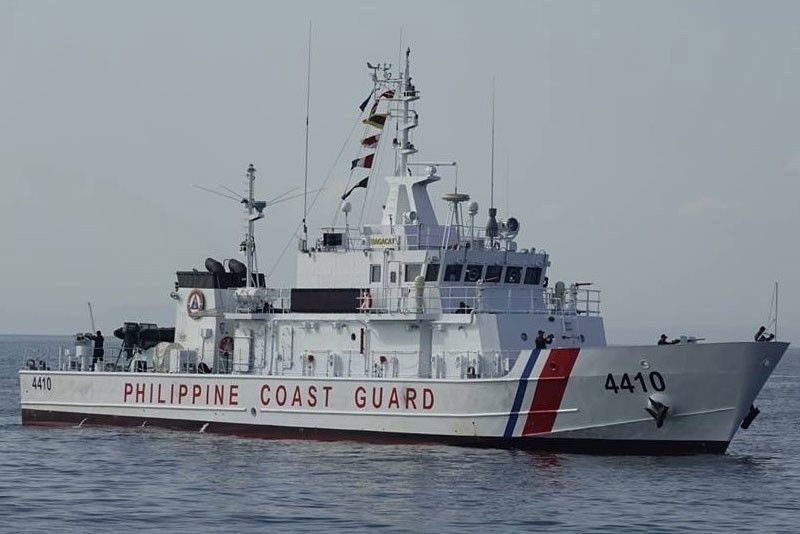Coast Guard has only three patrol vessels

MANILA, Philippines — The Philippine Coast Guard (PCG) has only three patrol boats capable of long deployment, and it needs at least 20 more to cover a bigger area in the West Philippine Sea where cases of Chinese incursions and harassment have gone up in the past weeks.
This was according to PCG spokesman for West Philippine Sea (WPS) Commodore Jay Tarriela, who added that the three offshore patrol vessels cannot be deployed at the same time.
“It is very important for us to have offshore patrol vessels because these are the types of vessels that can last for more than 10 days at sea and can extend our patrolling at the WPS and be present in our exclusive economic zone,” Tarriela said in an interview with CNN Philippines yesterday.
“If you can imagine how big the WPS is – and we only have three offshore patrol vessels and not deployed all at the same time because they have to do rotational deployment – we have some spaces in WPS that we fail to patrol constantly. So we are proposing with the coast guard modernization for the acquisition of more patrol vessels,” he added.
He did not name the three, but some of the most prominent PCG vessels are the Gabriela Silang, Tubbataha and Malapascua.
Tarriela said the PCG is also pushing for the establishment of response bases in Palawan, Subic, Mindoro and Northern Philippines.
“We believe the PCG needs to intensify its capability so we can be able to patrol our EEZ (exclusive economic zone) and make sure no foreign intruders would use our resources in the EEZ,” he added.
He also revealed the PCG is eyeing the inclusion of laser technology in its rules on the use of force after the laser-beaming incident in Ayungin Shoal involving the Chinese Coast Guard (CCG) earlier this month.
Tarriela said the PCG and the United States Coast Guard are currently in talks for joint patrols in the WPS.
Daily basis
Meanwhile, Foreign Affairs Secretary Enrique Manalo said Chinese harassment and incursions in the West Philippine Sea happen on a daily basis, depriving Filipino fishermen of livelihood and limiting access to the country’s natural resources.
“This is the situation but on a day-to-day basis there are still many events occurring in the South China Sea and there are daily incidents at least as far as we see it, cases of harassment or land reclamation which, in many cases, have been depriving the Philippines of the use of our exclusive economic zone,” Manalo said at a security conference in Munich, Germany when asked about Chinese activities that are not in conformity to international law.
“That’s more or less the daily situation that we face,” he said. “Our hope is that the international community in the context of affirming the need for a rules-based order will understand our position and help us and support not only the Philippines but other countries in ensuring that we have adherence to a rules-based order in the South China Sea.”
The secretary was a speaker in the discussion “Defending the United Nations Charter and the Rules-Based International Order.”
He noted that the United Nations should have a greater role in creating awareness on the importance of adhering to the rule of law in maritime affairs.
“Perhaps the Council could have a debate, maybe not necessarily directly on the arbitral award but on rule and order to prevail in the maritime domain in the South China Sea and to talks about UNCLOS (United Nations Convention on the Law of the Sea),” Manalo said.
He also said that while a discussion on the significance of the 2016 Arbitral Award in the United Nations Security Council might be difficult, there can be other discussions and debates on the matter in the UN General Assembly as well.
“It might be difficult in the Security Council for practical reasons if we look at the membership, but what I can say is that we need not have, for example, the decision of the Council. There can be open debates on this issue and create awareness of the issue not only in the Security Council but also in the General Assembly,” Manalo said at the security conference.
China is one of five permanent members of the Security Council. The others are the United States, United Kingdom, France and Russia.
Ten non-permanent members are elected for two-year terms by the General Assembly.
“Discussions like that would help create greater awareness on the importance of UNCLOS and also maintaining a rules-based order so that any disputes or conflict are settled through the rule of law and through peaceful means and not through coercive measures or aggressive moves,” he added.
The Philippines, Manalo said, hopes that the international community will understand its position and support other countries as well in ensuring adherence to a rules-based order in the South China Sea.
Advocate
Manalo stated that the Philippines has consistently advocated a rules-based international order and that the 2016 Arbitral Award on the South China Sea validated the Philippines’ position that China’s nine-dash line is incompatible with the UNCLOS.
He cited the international community’s broad support for the 2016 ruling of The Hague-based Permanent Court of Arbitration, calling it a mooring for a rules-based maritime regime in the South China Sea.
The Philippines lodged a diplomatic protest with the Chinese government last week over an incident wherein a CCG vessel pointed a military-grade laser at a PCG ship on a resupply mission in Ayungin Shoal, temporarily blinding some of its crew.
The Department of Foreign Affairs sent a strongly worded diplomatic protest to the Chinese embassy, condemning the “shadowing, harassment, dangerous maneuvers, directing of military-grade laser and illegal radio challenges by (CCG) vessel 5205 against PCG vessel BRP Malapascua on 6 February 2023.”
Held annually, the Munich Security Conference serves as a “unique platform for high-level debates on the greatest foreign and security policy challenges of our time.”
This year, most of the discussions revolved around the impact of Russia’s invasion of Ukraine.
- Latest
- Trending

































